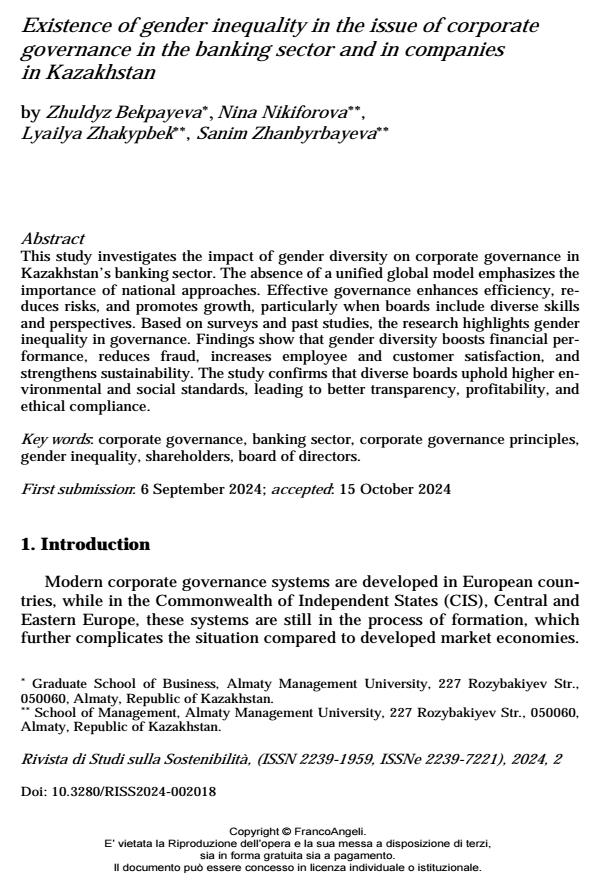Existence of gender inequality in the issue of corporate governance in the banking sector and in companies in Kazakhstan
Journal title RIVISTA DI STUDI SULLA SOSTENIBILITA'
Author/s Zhuldyz Bekpayeva, Nina Nikiforova, Lyailya Zhakypbek, Sanim Zhanbyrbayeva
Publishing Year 2024 Issue 2024/2
Language English Pages 19 P. 325-343 File size 234 KB
DOI 10.3280/RISS2024-002018
DOI is like a bar code for intellectual property: to have more infomation
click here
Below, you can see the article first page
If you want to buy this article in PDF format, you can do it, following the instructions to buy download credits

FrancoAngeli is member of Publishers International Linking Association, Inc (PILA), a not-for-profit association which run the CrossRef service enabling links to and from online scholarly content.
This study investigates the impact of gender diversity on corporate governance in Kazakhstan’s banking sector. The absence of a unified global model emphasizes the importance of national approaches. Effective governance enhances efficien-cy, reduces risks, and promotes growth, particularly when boards include diverse skills and perspectives. Based on surveys and past studies, the research highlights gender inequality in governance. Findings show that gender diversity boosts finan-cial performance, reduces fraud, increases employee and customer satisfaction, and strengthens sustainability. The study confirms that diverse boards uphold higher environmental and social standards, leading to better transparency, profita-bility, and ethical compliance.
Keywords: corporate governance, banking sector, corporate governance princi-ples, gender inequality, shareholders, board of directors.
- Alliance of Women’s Forces of Kazakhstan (2022). -- https://businesswomen.kz/.
- Bellotti E., Czerniawska D., Everett M.G., & Guadalupi L. (2022). Gender inequalities in research funding: Unequal network configurations, or unequal network returns?. Social Networks, 70: 138-151.
- Borodina S., & Shvyrkov O. (2010). Investments in the BRICS countries: risk assessment and corporate governance in Brazil, Russia, India and China. Moscow: Alpina Publishers.
- Cadbury A. (2004). Foreword to the book "Corporate Governance and Development". In: Development of Codes of Best Practice for Corporate Governance (pp. 3-5). Washington: Global Forum on Corporate Governance.
- Corporate Governance (2015). -- http://www.gmconsulting.kz/about/ku/14-korporativnoe-upravlenie.html.
- Di Miceli A., & Donaggio, A. (2018). Women on boards and in business leadership 2019. Private Sector Opinion, 42: 1-28.
- Executive search & Management selection. Women top managers: pathways for professional development (2019). -- http://surl.li/dzljq.
- IFC Supports First Sri Lanka Chapter of Women Corporate Directors to Promote Diversity in Boardroom (2020). -- https://pressroom.ifc.org/all/pages/PressDetail.aspx?ID=26733.
- Kabeer N. (2021). Gender Equality, Inclusive Growth, and Labour Markets. Women’s Economic Empowerment, 1: 13-48.
- Karapetyan D., & Gracheva M. (2004). Corporate governance: basic concepts and results of research practice. -- https://www.management.com.ua/strategy/str076.html.
- Kazakhstan Stock Exchange (KASE) (2022). -- https://kase.kz/ru/.
- KPMG. Corporate Governance (2022). -- https://home.kpmg/kz/ru/home/services/ advisory/risk-consulting/corporate-governance.html.
- Lane L., & Jordansson B. (2020). How gender equal is Sweden? An analysis of the shift in focus under neoliberalism. Social Change, 50(1): 28-43.
- Millstein I.M. (2005). Methodological materials of the Global Forum on Corporate Governance. Volume 1. Developing codes of best practice for corporate governance. Washington: Global Forum on Corporate Governance.
- Mohan M., Ferguson J.L., & Huhmann B.A. (2022). Endorser gender and age effects in B2B advertising. Journal of Business Research, 148: 60-75.
- Morgenroth T., Kirby T.A., Ryan M.K., & Sudkämper A. (2020). The who, when, and why of the glass cliff phenomenon: A meta-analysis of appointments to precarious leadership positions. Psychological Bulletin, 146(9): 797.
- Nguyen C.P. (2022). Uncertainty and gender inequality: a global investigation. Quarterly Review of Economics and Finance, 86: 31-47.
- NYSE Listed Company Manual. Section 303À.09 (2017). -- https://investor. tsmc.com/static/NYSE_Section_303A.pdf.
- Organization for Economic Co-operation and Development (OECD). Corporate governance principles (2000). -- http://koet.syktsu.ru/download/oesr.pdf.
- Poltavtsev A. (2017). The impact of the crisis on the practice of corporate governance, risk management and internal control: prospects for the development of bank performance standards. -- http://www.myshared.ru/slide/669472/.
- Povkh K., Kokoreva M., & Stepanova A. (2022). Institutional investors, investment horizon and corporate governance. HSE Economic Journal, 26(1): 9-36.
- Sterbenk Y., Champlin S., Windels K., & Shelton S. (2022). Is Femvertising the new greenwashing? Examining corporate commitment to gender equality. Journal of Business Ethics, 177(3): 491-505.
- The World Bank (2021). -- http://www.vsemirnyjbank.org.
- Zaid M.A., Wang M., Adib M., Sahyouni A., & Abuhijleh S.T. (2020). Boardroom nationality and gender diversity: Implications for corporate sustainability performance. Journal of Cleaner Production, 251: 1-19.
- Zhalgasovna A.G., & Rustamovich Y.Y. (2022). Corporate culture as a way to increase the efficiency of employees and its principles for stakeholders. TRANS Asian Journal of Marketing & Management Research, 11: 22-28.
Zhuldyz Bekpayeva, Nina Nikiforova, Lyailya Zhakypbek, Sanim Zhanbyrbayeva, Existence of gender inequality in the issue of corporate governance in the banking sector and in companies in Kazakhstan in "RIVISTA DI STUDI SULLA SOSTENIBILITA'" 2/2024, pp 325-343, DOI: 10.3280/RISS2024-002018